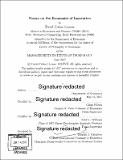| dc.contributor.advisor | Glenn Ellison and Heidi L. Williams. | en_US |
| dc.contributor.author | Llamas, David Colino | en_US |
| dc.contributor.other | Massachusetts Institute of Technology. Department of Economics. | en_US |
| dc.date.accessioned | 2017-09-15T15:29:47Z | |
| dc.date.available | 2017-09-15T15:29:47Z | |
| dc.date.copyright | 2017 | en_US |
| dc.date.issued | 2017 | en_US |
| dc.identifier.uri | http://hdl.handle.net/1721.1/111338 | |
| dc.description | Thesis: Ph. D., Massachusetts Institute of Technology, Department of Economics, 2017. | en_US |
| dc.description | Cataloged from PDF version of thesis. | en_US |
| dc.description | Includes bibliographical references (pages 183-191). | en_US |
| dc.description.abstract | This thesis consists of three chapters. In the first chapter, I estimate the dynamic or inter-temporal knowledge spillovers resulting from corporate R&D in a setting with cumulative innovation, using a panel of US firms and a network of corporate patent citations. I show that the positive effect of dynamic spillovers on other firms' productivity is economically important, and at least as large as that of own R&D investments. Accounting for both static and dynamic spillovers, my estimates suggest that the social returns to corporate R&D are about three times as large as the private returns. The second chapter, joint with Jean-Noel Barrot, studies the effect of patent term duration on the rate and direction of follow-on innovation, using a quasi-natural experiment that lengthened the term of existing patents in the US. Leveraging a kink in the patent term extension formula, we find no significant impact of extensions on subsequent innovation, neither locally around the kink using a sharp "Regression Kink Design" nor on average on the population of treated patents. The third chapter, joint with Nicolas Caramp and Pascual Restrepo, studies how consumer durables amplify business cycle fluctuations on aggregate employment. We show that employment in durable manufacturing industries is more cyclical than in other industries, and that this cyclicality is amplified in genera.I equilibrium. Our estimates suggest that consumer durables are responsible for up to 40% of aggregate employment volatility. | en_US |
| dc.description.statementofresponsibility | by David Colino Llamas. | en_US |
| dc.description.tableofcontents | 1. Cumulative Innovation and Dynamic R&D Spillovers -- 2. Patent duration and cumulative innovation: Evidence from a quasi-natural experiment (joint with Jean-Noel Barrot) -- 3. Durable Crises (joint with Nicolas Caramp and Pascual Restrepo). | en_US |
| dc.format.extent | 191 pages | en_US |
| dc.language.iso | eng | en_US |
| dc.publisher | Massachusetts Institute of Technology | en_US |
| dc.rights | MIT theses are protected by copyright. They may be viewed, downloaded, or printed from this source but further reproduction or distribution in any format is prohibited without written permission. | en_US |
| dc.rights.uri | http://dspace.mit.edu/handle/1721.1/7582 | en_US |
| dc.subject | Economics. | en_US |
| dc.title | Essays on the economics of innovation | en_US |
| dc.type | Thesis | en_US |
| dc.description.degree | Ph. D. | en_US |
| dc.contributor.department | Massachusetts Institute of Technology. Department of Economics | |
| dc.identifier.oclc | 1003290853 | en_US |
